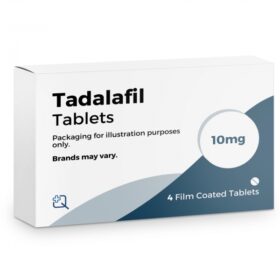- Your cart is empty
- Continue Shopping
Understanding Adderall: Uses, Effects, Alternatives, and Considerations
Adderall, a prescription medication primarily used to treat Attention Deficit Hyperactivity Disorder (ADHD) and narcolepsy, has gained significant attention both in medical circles and popular culture. This blog post will delve into the various aspects of Adderall, including its mechanism of action, uses, potential side effects, and alternatives. We will explore the broader context of stimulant medications, lifestyle factors, and considerations for those who may be seeking treatment options.
What is Adderall?
Adderall is a combination of two stimulant medications: amphetamine and dextroamphetamine. These compounds work by increasing the levels of certain neurotransmitters in the brain, primarily dopamine and norepinephrine. This increase enhances focus, attention, and impulse control, making it particularly effective for individuals diagnosed with ADHD.

Historical Background
Adderall was first approved by the FDA in 1996. Its roots can be traced back to earlier stimulant medications used in the 20th century. Initially developed for treating narcolepsy and obesity, the understanding of ADHD led to the reclassification of these stimulants as effective treatments for this condition.
Mechanism of Action
Adderall affects the central nervous system by promoting the release of neurotransmitters. It enhances the communication between neurons, which improves attention span and decreases impulsivity. This mechanism is particularly beneficial for those with ADHD, where neurochemical imbalances can disrupt normal functioning.
Uses of Adderall
ADHD Treatment
The primary use of Adderall is in the treatment of ADHD. Children, adolescents, and adults with this condition often struggle with attention, hyperactivity, and impulsiveness. Adderall helps to mitigate these symptoms, allowing individuals to perform better academically, socially, and professionally.
Narcolepsy Management
Adderall is also prescribed for narcolepsy, a condition characterized by excessive daytime sleepiness and sudden sleep attacks. The stimulant properties of Adderall help individuals stay awake and alert, improving their quality of life.
Potential Side Effects
Like any medication, Adderall comes with a risk of side effects. While many users tolerate the drug well, it is important to be aware of both common and severe side effects.
Common Side Effects
- Insomnia: Difficulty sleeping can occur, especially if the medication is taken later in the day.
- Appetite Suppression: Many users experience a reduced appetite, which can lead to weight loss.
- Dry Mouth: This is a frequent complaint among users.
- Increased Heart Rate: Stimulants can raise heart rates, which may be concerning for individuals with pre-existing heart conditions.
Severe Side Effects
While rare, some users may experience severe reactions, such as:
- Cardiovascular Issues: This can include increased blood pressure and heart problems.
- Mental Health Effects: Anxiety, paranoia, and mood swings can occur, particularly in individuals with a history of mental health issues.
- Dependency Risks: Due to its stimulant nature, there is a potential for misuse and dependency.
Alternatives to Adderall
For individuals who may be seeking alternatives to Adderall, several options are available. These can range from other medications to lifestyle changes and natural supplements.
Other Medications
- Ritalin (Methylphenidate): Another stimulant used to treat ADHD, Ritalin works similarly to Adderall but may have different effects on individuals.
- Strattera (Atomoxetine): A non-stimulant medication for ADHD, Strattera works by selectively inhibiting the reuptake of norepinephrine, making it a viable option for those sensitive to stimulants.
- Vyvanse (Lisdexamfetamine): This is a prodrug, meaning it is inactive until metabolized in the body. It has a lower potential for abuse compared to Adderall.
Natural Supplements
Some individuals explore natural supplements to manage ADHD symptoms. While these may not be as effective as prescription medications, they can be beneficial for some.
- Omega-3 Fatty Acids: Found in fish oil, these have been shown to support brain health.
- Zinc: Some studies suggest that zinc supplementation may improve ADHD symptoms in children.
- Magnesium: This mineral is crucial for many bodily functions and may help with hyperactivity.
Lifestyle Changes
In addition to medications and supplements, lifestyle changes can significantly impact ADHD management:
- Diet: A balanced diet rich in whole foods can support cognitive function. Some individuals find that reducing sugar and processed foods helps.
- Exercise: Regular physical activity has been shown to enhance focus and reduce symptoms of ADHD.
- Mindfulness and Meditation: Techniques that improve mindfulness can help individuals manage stress and improve concentration.
The Role of Therapy
While medications can be effective, therapy plays a crucial role in managing ADHD. Behavioral therapy, cognitive-behavioral therapy (CBT), and coaching can provide individuals with strategies to cope with their symptoms. Therapy can also address any co-occurring issues, such as anxiety or depression.
The Controversy Surrounding Adderall
Adderall’s popularity has led to a range of controversies. Concerns about misuse, particularly among college students and professionals looking for cognitive enhancement, have been raised. The pressure to perform can lead individuals to seek out stimulants without a prescription.
Misuse and Dependency
The potential for misuse is a significant concern. Adderall is classified as a Schedule II controlled substance in the United States, indicating a high potential for abuse. Some individuals may misuse it to enhance academic performance or for recreational purposes, which can lead to serious health issues.
Societal Pressure and Mental Health
The societal pressure to succeed academically and professionally can contribute to the misuse of medications like Adderall. As more individuals seek performance enhancement, the conversation around mental health and wellness becomes increasingly important.
Conclusion
Adderall remains a cornerstone in the treatment of ADHD and narcolepsy. While it offers significant benefits for many, it is essential to consider the potential side effects and the risk of misuse. Alternatives, including other medications, natural supplements, and lifestyle changes, can provide effective management strategies for those seeking them.
As awareness of ADHD and mental health continues to grow, so does the conversation surrounding treatment options. Whether through pharmacological means or lifestyle adjustments, the goal remains the same: to improve quality of life and support individuals in reaching their full potential.



